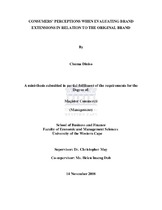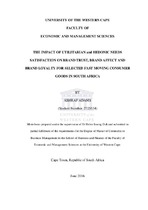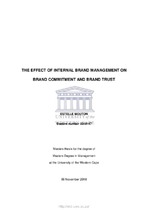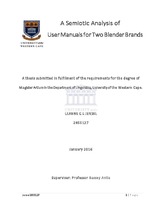Consumers' perceptions when evaluating brand extensions in relation to the original brand
Abstract
A brand extension strategy is one of the marketing tools that firms utilise to introduce new products in the market. One of the advantages of adopting this strategy is that firms are able to leverage on the positive image, reputation, and equity of a recognised and established brand,thereby reducing risk associated with launching new products.This study examines how consumers perceive the overall quality and similarity/fit of the brand extensions (Nike camera, Nike socks, and Nike golf balls) in relation to the original brand (Nike athletic shoes) and how these perceptions influence their attitudes towards the extensions. The
researcher proposes that the perceived overall quality of the brand extensions will be congruent to that of the original brand and that the attitude towards the brand extensions will be favourable only when there is a perceived similarity/fit between the brand extensions and the original brand.In order to get these insights, the study surveyed 147 undergraduate and postgraduate students
from the University of the Western Cape across all faculties. A non-probability convenience sampling method was used to access respondents. To collect data, qualitative and quantitative methods were employed using a questionnaire which consisted of open-ended and closed-ended questions in the form of free associations technique and 5-point Likert scales. The data gathered was analysed by means of descriptive statistics and Spearman correlation coefficient.
The findings indicate two things.(1) respondents only perceived Nike socks’ overall quality to be congruent to the original brand, Nike athletic shoes. (2) respondents only perceived Nike socks to be strongly similar to the original brand, Nike athletic shoes. Despite this, respondents had a favourable attitude towards all the brand extensions irrespective of whether they perceived the overall quality of the extensions to be congruent to the original brand or not, and whether they perceived the extensions to be similar to the original brand or not. These factors did not influence respondents’ attitudes towards the extensions negatively.
Collections
Related items
Showing items related by title, author, creator and subject.
-
The impact of utilitarian and hedonic needs satisfaction on brand trust, brand affect and brand loyalty for selected fast moving consumer goods in South Africa
Adams, Ashraf (University of the Western cape, 2016)The concept of brand loyalty highlights the importance of brands in marketing strategy development because it leads to a stream of benefits for the company (lower marketing costs, less price sensitivity, greater market ... -
The effect of internal brand management on brand commitment and brand trust
Mouton, Estelle (University of the Western Cape, 2018)The focus of branding is often externally focused, yet it is the employees through their direct interaction with the brand, that can make or break the brand promise. Despite the important role of employees in building ... -
A semiotic analysis of user manuals for two blender brands
Jensel, Leanne C.L. (University of the Western Cape, 2016)Technical documentation comes in a variety of forms such as installation or operation manuals, quick reference guides, maintenance manuals, user manuals, policy and procedure manuals or marketing brochures and flyers (Walsh, ...




